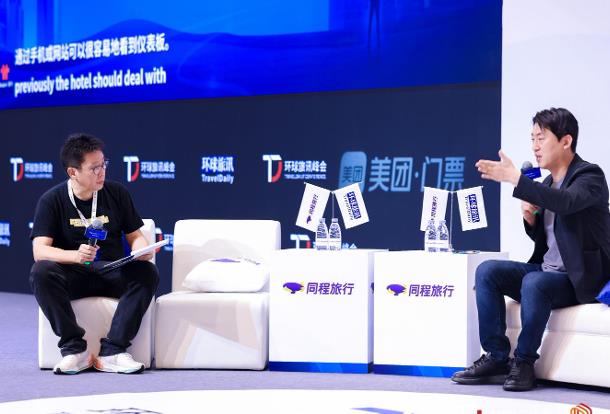ChinaTravelNews, Ritesh Gupta - Accommodation today isn’t just about spending a night in a property. In addition to staying, the lifestyle preferences and social elements, too, are being counted upon. Are hotels ready to transform themselves via an apt blend of design, content, technology, data and services?
Imagine staying at a historic site or monument in a custom-designed home. If you are fond of reading books then how about indulging in a bookstore at one of Ji Hotel’s property. BTG Homeinns Hotels Group’s relatively new brand Yunik is incorporating latest technology such as VR as part of the entertainment and social space, which would be different from a standardized lobby area.
All this exemplifies that the hospitality industry is vying for delivery of a superlative experience to win over travellers.
Gearing for the change
Hotels are experimenting and evolving in terms of their design, new amenities, service etc. Accordingly, the combination of data, content and technology, too, needs to improvise to attain guest-centricity.
For example, if a guest is allowed to read a book by scanning a QR Code, there is vital data that is being shared. There could be further ways of delighting a guest – via self-service kiosk, a robot or even a human interaction. If the guest provides feedback on reading preferences via any touchpoint, can a hotel offer a package around this hobby?
“It is imperative for hotel companies to support infrastructure for big data, and ensure content is ready to fully inform the traveller (about a hotel, destination-related activities etc.),” said Ted Zhang, CEO at DerbySoft. So as hotels intend to utilize the space in new ways, it is important to ensure their offerings are reflected across all the touchpoints - static descriptive (details about hotel’s services, amenities, facilities etc.), dynamic content (rates etc.) etc. Today there is reliance on API connectivity to even distribute content to intermediaries.
“We collect hotel content in different formats to transfer, store and distribute the content through an API. This way, distributors end up accessing the hotel content of different hotel chains through one single API. Through a combination of standard and custom APIs, XML files, spreadsheets, and 3rd-party-interfaces, DerbySoft manages to secure the content that distributors need,” Rudy Ruan, Regional Business Development Director at DerbySoft told ChinaTravelNews.com in a recent interview.
The ambit of this content also covers aspects such as local attractions to meet all the trip essentials of a guest, said Zhang.
Other than content, with guest being the focal point, data-centricity and technology, too, needs to evolve to support this shift. With a mobile device being an important ally, there are no boundaries to how being linked to a guest’s mobile device can trigger amazing interactions.
“(A) PMS (property management system) must enable the consumer to be in control of their stay via a mobile device,” acknowledged Xiaojun Lin is the CEO of Jointwisdom Information Technology.
Lin acknowledged that as the industry witnesses major changes, for example, a PMS facilitating flexible check-in and check-out options (say instead of check-in after 2 PM and 11 AM check-outs, a flexible option that a guest opts for), technology has to respond. In fact, Lin mentioned that PMS must facilitate what all a guest can do with a mobile device – check-in, check-out, pay for their stay and other services, selecting a room, interacting with housekeeping and availing room service, opening the door etc. “It is happening in China, if a guest is using a hotel’s app then it is possible today. Established hotel groups are letting guests being in control,” said Lin. It remains to be seen that how hotels let guests avail services when they book via intermediaries such as Ctrip, WeChat, Fliggy etc. Another important development is the use of facial technology for the check-in process. “The real promise of the facial technology comes to the fore only if there won’t be any need for the guest to wait and show their identity/ unique id at the reception,” said a source.
Technology of new hospitality players
In case of Huazhu, the group not only supports a proficient mobile application that facilitates booking, room selection, payment etc., but also empowers the staff in a number of ways. These include proprietary cloud-based H-PMS (for real-time inventory, yield management etc.), empowering the staff with a mobile app that enables the workforce at the property. But unlike established hotel companies, the relatively smaller ones are struggling with their traditional, closed technology set up.
On the other hand, new full stack hospitality technology companies like India’s OYO and Europe’s Sweet Inn are moving swiftly with their technology to run operations and serve guests.
Today apartments, work places etc. are also being added to hotels. But a specialist like Sweet Inn asserts that the requisite technology for managing apartments vis-a-vis rooms in a hotel can be different.
Unlike in hotels, where rooms belong to a category, each apartment has a distinctive appeal, depending upon the location - for instance, an apart around The Bund in Shanghai could be designed completely differently from one located in Shanghai Disneyland area, then the technology available in the form of PMS is falling short of expectations, according to Sweetinn.com’s Chief Revenue Officer, Eitan Reisel, who was in Hangzhou recently for TravelDaily's China Hotel Marketing Conference.
“Each apartment is considered to be an asset and is priced differently. They are maintained differently. On the other hand, rooms in a hotel tend to be same. There is standardization,” he said.
Reisel had an indifferent experience, when he started out with the company. "The technology which we initially used was legacy, old-fashioned and transforming for use was not easy for us. Sweet Inn initially started as a hospitality company but eventually we had to build on our expertise in technology too. The main reason being technology was not suitable for our operations. For example, inventory management - since apartments are distinct, managing them isn't the same for all, pricing and availability are different. Overbooking is a very common phenomenon in the hotel world. We cannot have this in our business. If we overbook, where would we shift the guest or the family? Next street? We don't have multiple apartments in one building."
“Pricing for hotels and apartments can't be compared. Hotels rely on a different set of parameters. Apartments in the same building could be priced differently, unlike rooms of a hotel. Also, pricing depends on the reviews, on which side of the street is the apartment located. Plus, we can’t overprice and under-price,” said Reisel, who added that’s one of the reasons why Sweet Inn has its own system – it’s called Sweet Inn Back Office (SIBO).
Real-time data + IT infrastructure
David Turnbull, Hospitality Entrepreneur and Advisor, and one of the co-founders of SnapShot, who chose to exit the company in July this year, highlighted that the missing component for hospitality businesses of all sizes is to focus on real-time property and destination-based data collection to better understand consumer behavior and how both the product and service can be optimized. “If hotels aspire to this collection and use of real-time data, the argument increases to move away from the current legacy PMS technology environments - that have served the industry admirably for the last 30 years - and invest in open cloud based platforms - potentially provided by existing PMS developers, that embrace Enterprise Service Bus (ESB) and Microservice infrastructure.” He further explained that adoption of any hotel operating system that uses the ESB/ microservice infrastructure will permit easy installation of mobile-based applications that aid any component of the guest experience or hotel operation. “The crucial factor is to ensure that there is a frictionless and consistent brand experience for the guest, and hotels’ applications and systems can retrieve core guest information to better serve the guests,” added Turnbull.
As for how companies can leverage perishable insights that can be harnessed to reward customers with improved on-site experiences, Turnbull mentioned that the current inability to collect and store live data about guests is the greatest limitation to providing richer and more personalized guest experiences. “RFID and IP tracking as well as sensor and beacon technology all have huge opportunities to stimulate the creation and collection of the necessary live and on-premise/ in-destination data collection to fuel the growth in service and experience personalization,” he said.
For hotels to strengthen their data strategy, they need to work with vendors that permit interoperability, flexibility, and open access to the data needed to power their guest experience. They can’t compete within a proprietary, closed ecosystem anymore. Zhang and Lin both acknowledged that open APIs and cloud-based software should form the basis for future expansion of hotel companies. There is a need for an open cloud-based PMS to plug in apps, tools and services quickly. This is critical as emerging or new hospitality players are focusing is on capturing of data around every activity of the guest. This battle for a personalised service is worth following - a hotel vs. a vacation apartment vs. sharing economy property or any other accommodation - let's see who wins!




